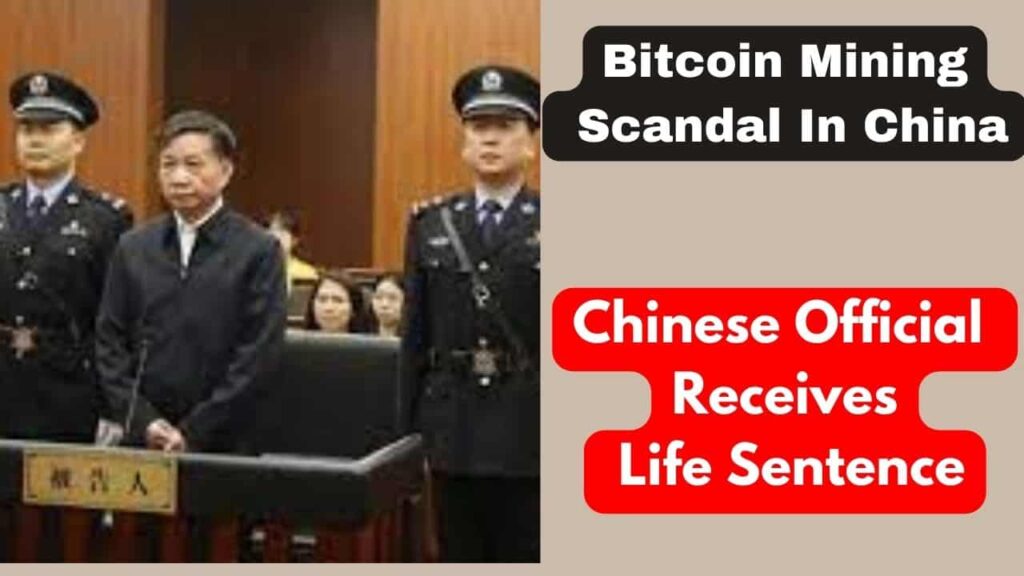A noteworthy event has taken place as a senior Chinese government official has been handed a life sentence due to his intricate involvement in a case entwining Bitcoin mining and corruption or You can say Bitcoin Mining scandal . The individual at the center of this matter is Xiao Yi, who once held a significant position within the Jiangxi Provincial Political Consultative Conference Party Group. The verdict pronounced him guilty of orchestrating an extensive, unauthorized Bitcoin mining venture and being part of corrupt activities.

The Intermediate People’s Court of Hangzhou City brought this case to a close on August 22, a day that will undoubtedly resonate within the nation. This legal proceeding brought to light a chain of transgressions, encompassing abuse of power, bribery, and the inappropriate use of public resources. The court’s findings pointed to Xiao Yi as the mastermind behind an illicit Bitcoin mining project that aggregated a staggering sum of 2.4 billion Chinese yuan, roughly equating to $329 million..
The Unveiling of the Mining Operation and Bitcoin Mining Scandal
At the heart of the case is Xiao Yi’s dual role as both a government official and the mastermind behind a sprawling Bitcoin mining scheme. The court’s investigation revealed that he had funneled financial resources and electricity subsidies to a company called Jiumu Group Genesis Technology, situated in Fuzhou. This company was operating an extensive fleet of over 160,000 Bitcoin mining machines. To cover his tracks, Yi manipulated official records, including altering statistical reports and electricity consumption figures.
During the period from 2017 to 2020, an astonishing 10% of Fuzhou’s total electricity consumption was attributed to the operations of the Jiumu Group. This marked surge in power usage set off alarm bells, sparking suspicions that ultimately unraveled a long-standing corruption scheme that spanned over a decade.
The surge in electricity consumption became a focal point in the investigation, shedding light on activities that had remained hidden for years. This increase, far beyond what would be considered typical, prompted a deeper examination into the operations of the Jiumu Group and its ties to the larger case. The discoveries made during this investigation played a pivotal role in uncovering the extent of the corruption scheme that had been concealed beneath the surface.
This serves as a reminder that even seemingly minor irregularities can often lead to the exposure of more significant wrongdoings. The diligent efforts of those tasked with scrutinizing such patterns are crucial in maintaining transparency and accountability within various sectors. The electricity consumption anomaly turned out to be the linchpin that led to the exposure of a much larger and intricate web of corruption.
Bitcoin Mining Scandal : The Verdict and Its Wider Significance
The Hangzhou court’s decision marked a turning point in Xiao Yi’s story. His actions were deemed both corrupt and a misuse of power, bringing the curtain down on a lengthy investigation into bribery incidents that spanned from 2008 to 2021. The court concluded that Yi’s activities went against both ethical principles and legal norms, eroding the trust that the public places in government officials.
It’s worth noting that Xiao Yi’s admission of guilt and his willingness to make amends played a role in the court’s ruling. He voluntarily returned the embezzled funds and handed over all the illicit profits generated through his various unlawful activities. The court’s decision serves as a strong message against the abuse of power and public resources for personal gains, echoing throughout China’s political landscape.
Cryptocurrency Regulations and Ongoing Enforcement
China has maintained a strict stance when it comes to cryptocurrencies. While outright ownership is allowed, the country has implemented a comprehensive ban on cryptocurrency transactions, exchanges, and fiat-to-crypto operations. This is in line with the government’s ongoing efforts to curb financial activities involving cryptocurrencies.
In a recent case on August 3, a Chinese court invalidated a $10 million Bitcoin lending contract, citing the country’s unambiguous Bitcoin ban and ruling out any potential for legal debt recovery. The authorities have also taken action against individuals; a Chinese national was sentenced to nine months in prison for assisting another individual in purchasing Tether (USDT) and making a profit of $20 from the transaction.
Lessons from Xiao Yi’s Bitcoin mining scandal
To conclude , the intricacies surrounding Xiao Yi’s case illuminate the resolute dedication of the Chinese government to safeguard integrity within its hierarchy and uphold the principles of justice in the midst of dynamic shifts in financial landscapes and technological progress. The unfolding drama serves as a poignant reminder that the rule of law remains impartial, reaching every individual, regardless of their societal status.
Beyond the specifics of the case, broader questions arise about the interplay of technology, finance, and governance. In a world propelled by rapid digital transformations, the case prompts contemplation on how legal systems must evolve to grapple with the intricate complexities that come with this changing terrain. The tale of Xiao Yi highlights the urgency for legal frameworks to adapt and effectively address emerging challenges in the digital age.
Ultimately, the narrative reverberates beyond the courtroom, resonating as a testament to the significance of accountability, transparency, and the unwavering pursuit of justice in the face of an ever-evolving world.






























